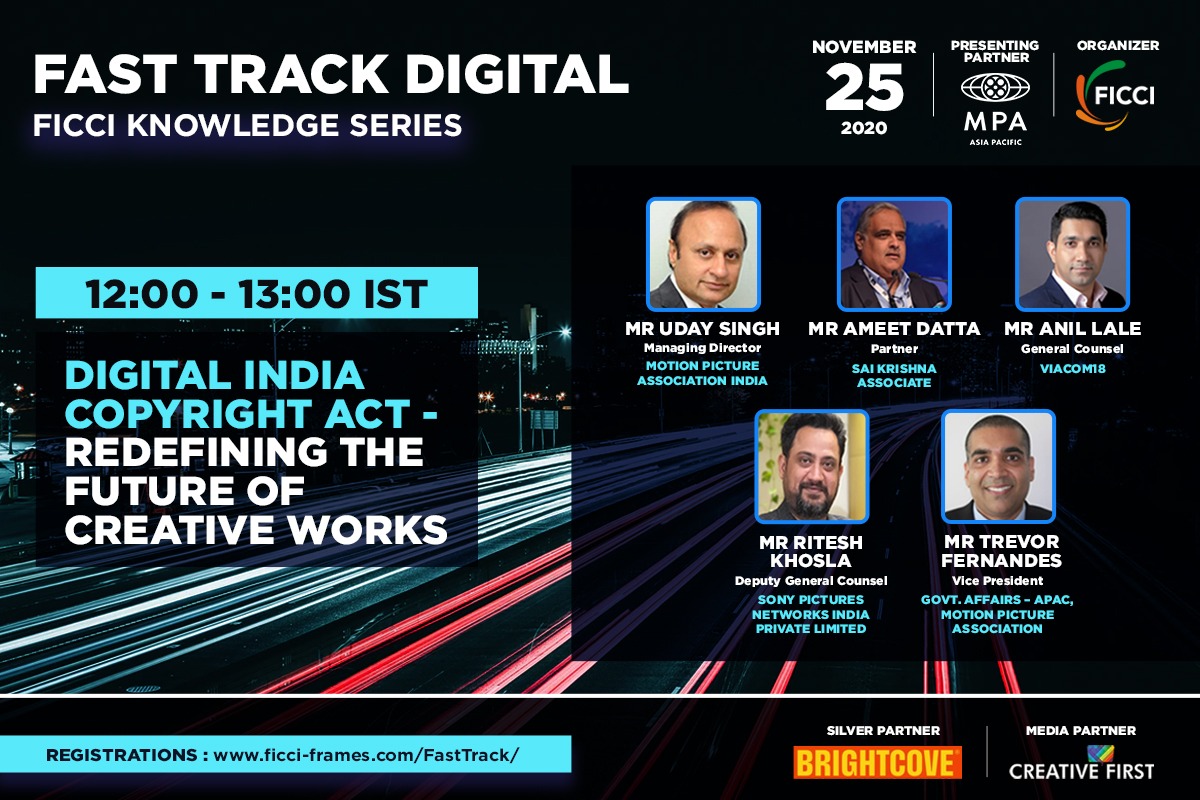
Titled ‘Digital India Copyright Act – Redefining the Future of Creative Works’, the 2nd session of 5th Edition of FAST TRACK DIGITAL, organised by FICCI and presenting partner, the Motion Pictures Association (MPA), delved deep into the various aspects of the Copyright Act of 1957.
Moderating the session, Mr. Trevor Fernandes, Vice President, Govt. Affairs – Asia Pacific, MPA, emphasised the need to protect the intellectual property rights to highlight the importance of content protection. He also applauded the growth of the Indian market in recent decades, and was confident that the MPA’s effort in this space, would complement and have a positive impact the market.
On the topic of amendments in the Copyright Act of 1957, Mr. Fernandes said that while revisiting an Act that was last reviewed in 2012 was justified, he cautioned that 2020 was not the time to rush changes without very careful deliberation and policy calibration.
Mr. Ameet Datta, Partner – Sai Krishna Associates, saw room to improve enforcement against digital piracy and make enforcement more timely in the new global digital era. He praised the Delhi High Court for being innovative where site blocking is concerned, and he also applauded the MPA for taking a lead in helping the courts to develop their jurisprudence. He also made suggestions about how the industry and Government can collaborate so that resources are well spent for better solutions. More broadly he said that the Copyright Act could also include modalities to fight digital piracy.
Mr. Anil Lale, General Counsel, Viacom18, added that piracy needs to be tackled more stringently as it’s more than infringement, and hurts the creative economy a lot. Mr. Ritesh Khosla, Deputy General Counsel, Sony Pictures Networks India, agreed with the rest of the panel that piracy and copyright infringement are eroding revenues for all major industry players. He then drew attention to the need of defining piracy clearly in the Copyright Act, which is not currently the case. He urged that the government look at piracy as an economic offence.
Talking about the efforts of MPA and the Alliance for Creativity and Entertainment (ACE), Mr. Uday Singh, Managing Director, MPA India, said, “The MPA and ACE has been set up as an answer to this multi-jurisdictional and shape-shifting problem, where it tries to stimulate a legitimate marketing environment for our businesses and also to raise the cost for the pirate to do business and reduce the cost for our legitimate players. Multiple jurisdictions have tried to put voluntary measures in place and what we have been able to achieve with the Telegram Monitoring Project (TMP) is a very good step in that direction.”
Mr. Fernandes concluded the session by referring to one of MPA’s longstanding efforts in India – the clamp down on camcording content in cinemas, and what it means in this newly digitised entertainment world. Mr. Singh said, “The uphill battle continues. Last, we appeared before the parliamentary committee and the recommendations have already gone through. And though there will be Covid 19-related delays. In the end it is just a small provision in the Cinematograph Act which will hopefully cross the line in the parliamentary session now scheduled for January 2021.